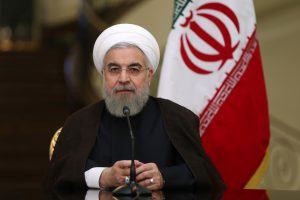TEHRAN, June 26, 2018 (AFP) – Iranian President Hassan Rouhani called on Tuesday for national unity to preserve “confidence” and “hope” in the face of unrest over the Islamic republic’s mounting economic woes.
Rouhani’s remarks came as vendors in Tehran’s Grand Bazaar, a traditional area of support for Iran’s leadership, continued a rare strike that began Monday over the collapse of the rial on foreign exchange markets.
“The media, the scholars, the preachers, the (Shiite) seminaries, all those with a public voice, the parliament, the judicial system… we must all join hands,” Rouhani said in a long televised address during an annual conference organised by the judiciary.
“I assure you that if we can safeguard these two assets — hope and trust (of the people) — we can overcome all problems,” Rouhani said.
“Why should people worry? Today, this anxiety is created by the media of the enemies. They are doing their job… but we expect more (support) from our friends,” the president said.
A moderate conservative elected in 2013 and re-elected in 2017 with backing from reformers, Rouhani has been under attack in recent weeks from Iran’s ultra-conservative camp — be it editorials in the press or sermons from imams in cities across the country.
Critics accuse the government of neglecting the most vulnerable segments of the population from inflation and price hikes, and instead focusing on reforms they deem non-essential like the admission of women into football stadiums.
Iran’s currency has plunged almost 50 percent in value in the past six months, with the US dollar now buying around 85,000 rials on the black market.
Tehran has faced mounting economic woes since the United States in May pulled out of a 2015 nuclear accord between Tehran and world powers that lifted international sanctions in exchange for a scaling back of the Islamic republic’s atomic programme.
Apart from the rial’s collapse, the Iranian private sector has long been starved of investment, its banking system is crippled by bad loans and record levels of unemployment mean a third of under 30-year-olds are out of work.
—
Iran’s Rouhani calls for unity in face of economic woes
 Iranian President Hassan Rouhani speaks with media in a joint press conference with his Austrian counterpart Heinz Fischer after their meeting at the Saadabad Palace in Tehran, Iran, Tuesday, Sept. 8, 2015. Iran's president said on Tuesday that his country is ready to hold talks with the United States and Saudi Arabia on ways to resolve Syria's civil war, providing such negotiations can secure peace and democracy in conflict-torn Syria. (AP Photo/Ebrahim Noroozi)
Iranian President Hassan Rouhani speaks with media in a joint press conference with his Austrian counterpart Heinz Fischer after their meeting at the Saadabad Palace in Tehran, Iran, Tuesday, Sept. 8, 2015. Iran's president said on Tuesday that his country is ready to hold talks with the United States and Saudi Arabia on ways to resolve Syria's civil war, providing such negotiations can secure peace and democracy in conflict-torn Syria. (AP Photo/Ebrahim Noroozi) 